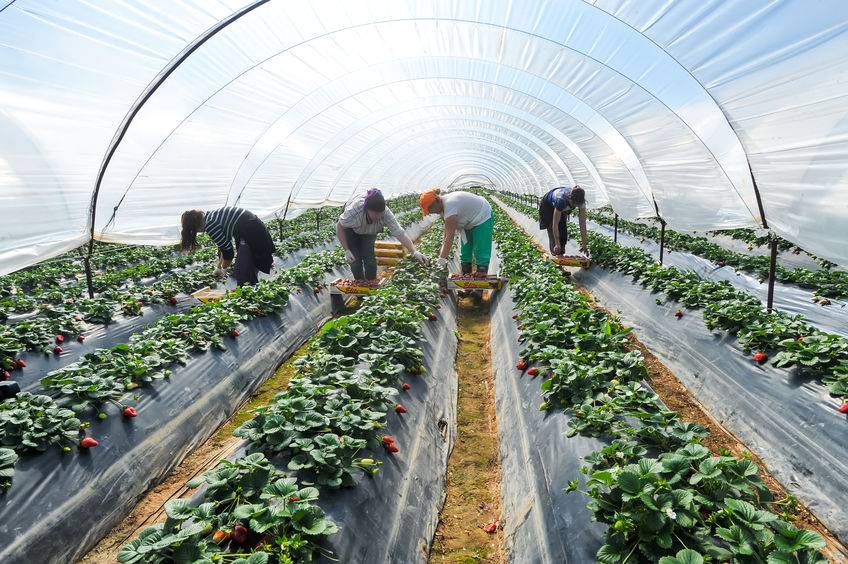
Strawberries and lettuce crops worth £30 million ended up as waste in the UK in 2015, with pest and disease damage being one of the causes, according to new research.
This waste was the result of factors relating to forecasting and product specifications, such as throwing away mis-shaped crops, and pest and disease damage.
The first indication of the scale of food waste at farm-level was measured for two key crops, strawberries and lettuce.
It is estimated that £30 million worth of strawberries and lettuce ended up as waste in the UK, in 2015.
The study estimates that just over nine per cent of mature strawberry crops ended up as waste in 2015, equivalent to 10,000 tonnes of product across the whole sector and valued at £24 million.
The main causes for this were linked to product not meeting quality requirements, primarily as a result of fruit being misshapen or suffering from pest or disease-related damage.
Accurate weather forecasting
For lettuce, the research found that around nineteen per cent of all lettuces were unharvested in 2015, with 38,000 tonnes lost across the sector worth an estimated £7 million.
More accurate forecasting of weather by both growers and their customers was cited as the main action to prevent lettuce crops going to waste, together with changes to specifications for head sizes.
In both sectors the research found considerable variation between producers - between 3% and 17% of production ended up as waste for strawberries, and 7% to 47% for lettuce.
Whilst there is currently uncertainty around what causes this variation, the research demonstrates scope to reduce waste by identifying and sharing best practice, and benchmarking different supply chains.
WRAP believes that addressing food waste in primary production requires a combination of different interventions and a collaborative approach across the supply chain.
The organisation said this would involve, for example, better supply and demand management in lettuce value chains and, for strawberries, greater flexibility is required to enhance supply chain management, and consideration of new varieties.
'Normalise'
National Farmers' Union (NFU) director of policy Andrew Clark, said food waste is in "no one's interest, least of all farmers".
"Improved forecasting, for example, would provide farmers and growers with an opportunity to plan ahead, secure land and pre-order seed," explained Mr Clark.
"Retailer product specifications are important and beneficial to maintain produce quality, but these can also be problematic when they are not responsive to seasonal challenges.
"We welcomed a recent recommendation from the Environment, Food and Rural Affairs Committee that supermarkets should relax rules and look to ‘normalise’ foods that may have slightly different colours, shapes or sizes.
Mr Clark concluded: "Farmers and growers want to minimise waste as much as possible, and they work hard to tackle pests and disease by improving agronomy, harvesting and processing techniques. The whole industry needs to pull together to identify solutions right across the supply chain and do their bit to keep waste to a minimum."
Crop forecasting
A number of projects have now begun aiming to reduce food waste, focusing on priority crops including soft fruit, root vegetables and salad.
Asda’s sourcing arm IPL is adding to its commercial intelligence with expertise from Agrimetrics and the National Institute of Agricultural Botany (NIAB) to help its growers use a new yield forecasting tool.
Growers now use smart phones to upload photos of their crop throughout the season, and intelligent software uses these images to assess the crop’s potential in relation to data from local weather stations, and historical data.
Growers, IPL and Asda receive a yield report to make accurate decisions earlier in the season that reduce the risk of both gluts, and shortages, at farm and retail level.
At the end of the season growers can use the data to understand how to improve management of the crop in subsequent years to produce higher marketable yields.
'Wonky vegetables'
A number of ‘wonky vegetable’ initiatives have been introduced by retailers over the last eighteen months.
WRAP is focussing on carrot and parsnip schemes and working with several supply chains to gather data and opinions from growers and suppliers.
This will be used to refine best practice to be shared throughout the sector to leverage greater impact.
A common cause of strawberry waste is product not meeting customer specifications, because of fruit being misshapen or suffering from pest or disease-related damage.
One way growers can manage this is through improved growing systems, however the investment costs can be a barrier to this.
The Co-op, IPL and Asda are tackling this together through a demonstration project that provides growers with data on investment costs and the returns they can make. It is hoped this will help growers make better informed decisions about their businesses’ future, whilst reducing food waste.
